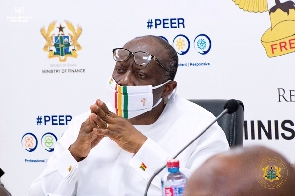 Finance Minister, Ken Ofori-Atta
Finance Minister, Ken Ofori-Atta
Ghana has successfully issued a record size Eurobond of US$3.25 billion, while enhancing its market access through the use of a 4-year Zero-Coupon Tranche, first emerging market Sovereign to add a zero-coupon bullet tranche to its bond financing portfolio.
This, according the government is a testament to its hard-won credibility with investors, strong growth prospects and disciplined fiscal consolidation efforts in 2020.
The issuance which was twice oversubscribed amid a global pandemic, which peaked at over US$6 billion.
Commenting on the bond, Ken Ofori-Atta, Finance Minister said, “This historic bond issuance is a strong signal that investors have confidence in our plan for debt sustainability, economic recovery and growth and that Ghana remains a Pillar of Stability”.
“Part of the proceeds shall be used for domestic liability management. For example, using US$400m of the zero-coupon bond to refinance domestic debt with an average interest rate of 19% will net Ghana savings of some $200 million over the four years,” Mr. Ofori-Atta explained.
Government has said that the proceeds will, alongside conducting liability management, also support the budget deficit by funding growth-oriented expenditures.
This bond issuance comes after a series of fixed-income virtual meetings held locally across three (3) days with Investors from the United States, United Kingdom, Europe, Middle East and Asia. The transaction comprised US$525 million 4-Year Zero Coupon, US$1 billion 7-year Weighted Average Life (WAL), US$1 billion 12-year WAL and US$500 million 20-year WAL. The traditional Eurobonds priced at 7.75%, 8.625% and 8.875%, respectively.
Ghana successfully raised US$2 Billion in 2018, US$3 Billion in 2019 and US$3 Billion in 2020.
Government says the 2021 successful bond issuance should boost business confidence as the it looks to stimulate the economy and increase revenue through what it calls “burden-sharing” for “enhanced profit sharing.”
The Joint Lead Managers for the transaction were BofA Securities, Citi, Rand Merchant Bank (RMB), Standard Bank and Standard Chartered Bank. They were supported by CalBank PLC, Databank, Fidelity Bank, IC Securities and Temple Investments as Co-Managers.